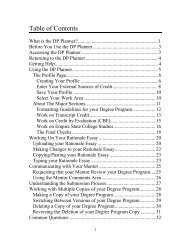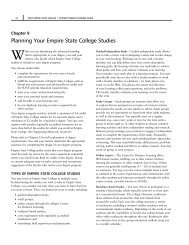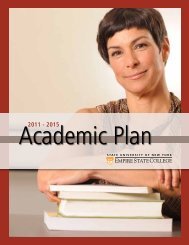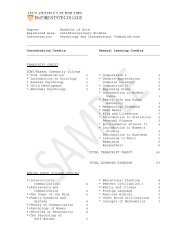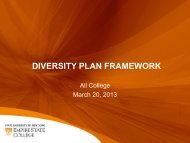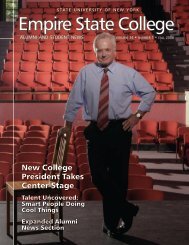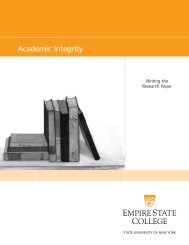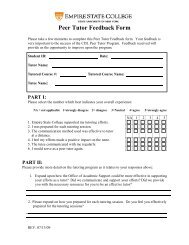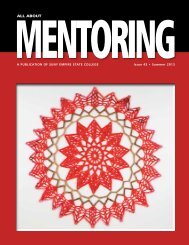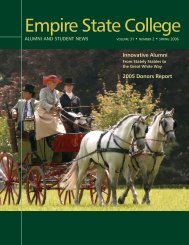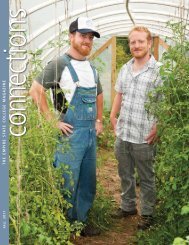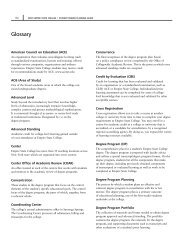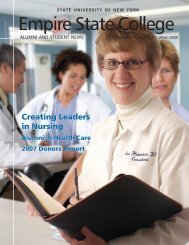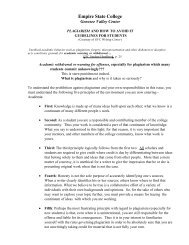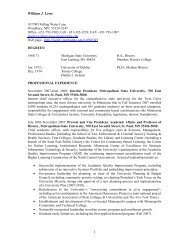All About Mentoring Spring 2011 - SUNY Empire State College
All About Mentoring Spring 2011 - SUNY Empire State College
All About Mentoring Spring 2011 - SUNY Empire State College
Create successful ePaper yourself
Turn your PDF publications into a flip-book with our unique Google optimized e-Paper software.
65<br />
Found Things:<br />
<strong>Empire</strong> <strong>State</strong> <strong>College</strong> Objectives<br />
In 1973, <strong>Empire</strong> <strong>State</strong> <strong>College</strong> published its<br />
third “bulletin.” (Even now, it’s been less<br />
than a decade since the college created its<br />
first “catalog.”) Like the first bulletin (1971-<br />
1972), the overall spirit of this 104-page,<br />
5 ½ x 7 ½ inch document is captured in<br />
the description of the “objectives, processes<br />
and academic offerings” of the college.<br />
Particularly telling is the section, “<strong>Empire</strong><br />
<strong>State</strong> <strong>College</strong> Objectives,” included here.<br />
Written by the college’s founding academic<br />
vice president, Arthur Chickering, these<br />
“objectives” offer a glimpse of the ways in<br />
which the college sought to communicate<br />
its core values about knowledge and<br />
“personal development.”<br />
Thanks, as always, to our college historian,<br />
Richard Bonnabeau, for assistance in this<br />
archival work, and to Arthur Chickering<br />
for his help in our efforts to search out<br />
the document’s author. Readers might be<br />
interested in comparing the language and<br />
the ideas in this document with Chickering’s<br />
summer 2010 publication, “Our Purposes:<br />
Personal Reflections on Character<br />
Development and Social Responsibility<br />
in Higher Education” (Liberal Education,<br />
96 [3].)<br />
Educational effectiveness is enhanced<br />
when the objectives and their<br />
relationships to the institutional<br />
policies and practices are spelled out. The<br />
chance of generating contradictory forces<br />
which cancel one another is then minimized.<br />
When an educational institution believes<br />
in its objectives, it sets into motion forces<br />
which affect everyone associated with it.<br />
Students must weigh their own purposes<br />
and values against those of the institution.<br />
They then must determine whether there<br />
is sufficient agreement between the two to<br />
warrant committing their time and energy<br />
to the institution. Clearly stated objectives<br />
make this determination possible.<br />
For these reasons, we take time to be as<br />
clear as we can about the educational<br />
objectives embedded within the admissions<br />
process, the Learning Contracts, the<br />
educational resources and special programs,<br />
and the academic procedures and standards.<br />
What are our objectives Think of<br />
a pyramid. At its apex are simple<br />
communication and reading skills. These<br />
skills are supported by several major<br />
blocks of intellectual competence, which<br />
rests on six major dimensions of personal<br />
development. Though they are described<br />
sequentially and range from the simple and<br />
concrete to the abstract and complex, when<br />
a man or a woman enters the <strong>Empire</strong> <strong>State</strong><br />
program, all three levels of objectives are<br />
met at once.<br />
<strong>Empire</strong> <strong>State</strong>’s program places a premium on<br />
oral and written communication, including<br />
effective reading ability.<br />
When a prospective student visits a<br />
Learning Center, he needs to be able to<br />
read the materials available there and to<br />
talk with others about his interests and<br />
what the Center offers. To complete the<br />
Admissions Prospectus, he must write<br />
answers to difficult questions. Planning,<br />
implementing, and evaluating Contracts<br />
and Programs of Study calls for continual<br />
oral and written exchanges between<br />
student and Mentor. Most Contracts<br />
require substantial reading and written<br />
reports.<br />
<strong>Empire</strong> <strong>State</strong>’s program requires several<br />
major aspects of intellectual competence:<br />
knowledge, comprehension, analysis,<br />
evaluation, synthesis and application.<br />
Knowledge involves more than recalling<br />
specific bits of information, i.e., terminology,<br />
dates and facts. It includes knowledge<br />
of conventions, trends and sequences,<br />
classifications and categories, and major<br />
theories or generalizations which are<br />
appropriate in a given field. It also includes<br />
knowledge of the methods of inquiry and<br />
The Bulletin<br />
of the criteria by which facts, principles, or<br />
opinions are judged. Knowledge is acquired<br />
through memorization and direct experience,<br />
and is reinforced by use.<br />
Donald Wentworth and Dolores Guion<br />
were granted advanced standing in<br />
part because they had acquired such<br />
knowledge through education and prior<br />
work experience … Emma Schmidt’s<br />
knowledge of philosophy and group<br />
dynamics will grow as she reads Spinoza,<br />
Bales, and others, just as Bob Lenard’s<br />
knowledge of Greek culture will expand<br />
as he reads The Iliad.<br />
Comprehension converts information<br />
acquired through memorization into<br />
working knowledge. It is evident when<br />
people can translate information from<br />
one form or another, can express it in<br />
their own words, in mathematical terms,<br />
in artistic products or literary metaphors.<br />
Comprehension is indicated by the power to<br />
interpret and extrapolate ideas, and when<br />
the consequences are consistent with the<br />
information given.<br />
suny empire state college • all about mentoring • issue 39 • spring <strong>2011</strong>



